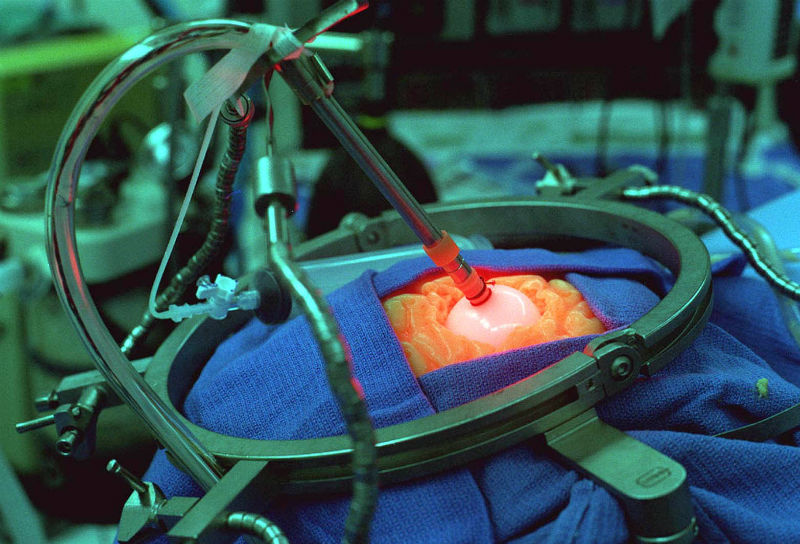An American 'super warrior': Pentagon's latest spooky idea
US soldiers' brains could be hooked up via the internet so they can act on orders without thinking

A free daily email with the biggest news stories of the day – and the best features from TheWeek.com
You are now subscribed
Your newsletter sign-up was successful
Prepare yourselves for the latest idea from the folks who brought you Predator drones, Stealth jet fighters and the internet: mind control.
The Pentagon – or, to be precise, the Pentagon's Defence Advanced Research Project Agency (Darpa) – is spending a fortune on a programme whereby cybernetic implants can be inserted into the brains of soldiers and veterans in order to “read” their moods. Using the internet, remote signals could then be sent to correct those moods.
It is known as Subnets, for Systems-Based Neurotechnology for Emerging Therapies (not to be confused with subnets as in subnetworks).
The Week
Escape your echo chamber. Get the facts behind the news, plus analysis from multiple perspectives.

Sign up for The Week's Free Newsletters
From our morning news briefing to a weekly Good News Newsletter, get the best of The Week delivered directly to your inbox.
From our morning news briefing to a weekly Good News Newsletter, get the best of The Week delivered directly to your inbox.
The first phase, which should be operational within five years, is designed to switch off attacks of post-traumatic stress disorder - once known as shell shock - as part of the treatment of affected soldiers and battlefield veterans.
Imagine how efficient that would have been when persuading the infantry of World War One to scramble from their trenches into the teeth of lethal machine-gun fire.
Darpa plans to seek federal approval to market the technology for civilian use against depression and other mental disorders, which makes it sound benign, if a bit weird.
After all, this “treatment” begins with drilling holes in your skull so that the probes, linked to the internet to send constant signals to-and-fro, can be sunk into the “soft tissue” of the brain.
A free daily email with the biggest news stories of the day – and the best features from TheWeek.com
But that is just the start of it.
The end goal is to create a “super warrior” with the ability to “turn thoughts into acts” via the probes and the internet connections. Is it just coincidence that both the terms ‘internet’ and ‘Subnets’ come from Darpa?
Among Darpa's many Dr Strangelovian triumphs has been the development of battlefield robots. And surely Subnets sounds like an inexpensive version of a robot.
Instead of building a remote controlled body around an information and command system, why not take over nature’s information and command system in a ready-made body which costs, in the form of a young foot soldier, a mere $15,000 a year?
Justin Sanchez, the programme manager, tells Defense One magazine that Darpa is “looking for ways to characterise which regions [of the brain] come into play for different conditions – measured from brain networks down to the single neuron level – and develop therapeutic devices that can record activity, deliver targeted stimulation, and most importantly, automatically adjust therapy as the brain itself changes.”
This is not the Pentagon’s first attempt to create a “super warrior”. Drone pilots, for instance, are already experimenting with electric shocks designed to keep them alert for up to seven days.
“The Air Force,” reports Defense One, “has been studying the effects of low amounts of electricity on the brain by using a non-invasive interface… The objective is to deliver a caffeine-like boost to help soldiers stay alert through long stretches of piloting or screen interaction.”
The military loves acronyms: this experiment is known as CAP, not for the strange headgear but for Continuous Assisted Performance.
Darpa was founded in 1958 in direct response to the Soviet Union’s launch of the Sputnik satellite, which gave the Soviets the lead in the Cold War space race. The idea was to make sure that America would keep command of all future technology which might have a use in warfare.
The internet remains its best known idea. But it also revolutionised the infantry rifle with Project Agile, the light-weight, fast-shooting M16.
There are ethical issues. Dr Jonathan Moreno of the University of Pennsylvania, who has sat on President Obama’s bio-ethics panel, has written two books on the history and rights-and-wrongs of such experiments – Mind Wars and Body Politic.
“The ethical issues suggested by such work should be flying off this page by now,” he writes. “How will individuals be recruited to try what will obviously be very dangerous experiments? If such experiments are done in secret, how will they be ethically reviewed?
"What are the dangers of such information falling into 'the wrong hands', and are there any 'right hands' for this kind of knowledge? Is any extension of human abilities justified by the need for the state to protect a society that is free and democratic?”
More recently, Moreno said he thought that the “science fiction scenarios about super soldiers” remained years ahead – though he added this rider: “I’m sure we’re in for some surprises along the way.”
From the looks of it, most of them will be nasty.
-
 The environmental cost of GLP-1s
The environmental cost of GLP-1sThe explainer Producing the drugs is a dirty process
-
 Nuuk becomes ground zero for Greenland’s diplomatic straits
Nuuk becomes ground zero for Greenland’s diplomatic straitsIN THE SPOTLIGHT A flurry of new consular activity in Nuuk shows how important Greenland has become to Europeans’ anxiety about American imperialism
-
 ‘This is something that happens all too often’
‘This is something that happens all too often’Instant Opinion Opinion, comment and editorials of the day